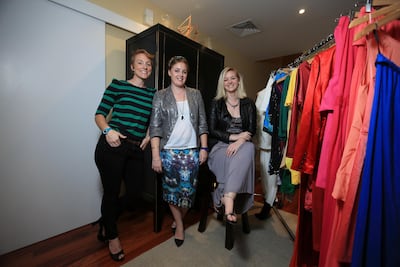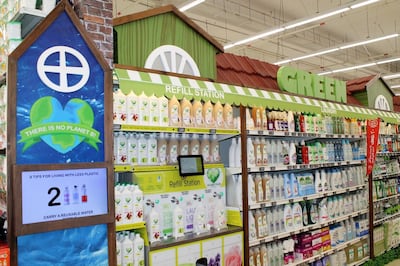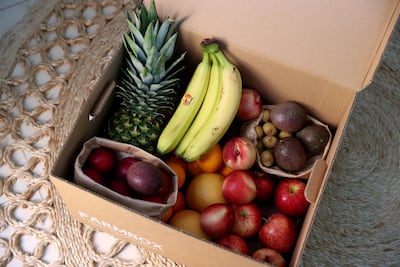From buying sustainably to ensuring the best labour conditions are used to make the products you purchase, ethical shopping is coming to the fore in the UAE, as consumers try to be more socially responsible.
Filipina Mia Balansag, who has lived in Abu Dhabi for 12 years, is better known as Facebook’s "EnviroMom Mia" and set up the platform’s Abu Dhabi EnviroMoms Group last year.
She says that ethical shopping is not a “buying frenzy” to replace plastic household goods with “eco-friendly” ones.
“We need to go back to basics in understanding our shopping habits and making use of what we already have that will serve our purpose,” she says.
Here are seven things you can do right now to become a more ethical shopper.
Shop less
Ms Balansag kicked off 2019 with a 90-day no-shopping challenge and says she now waits a day to reflect before buying a new item and doesn’t take credit cards with her if she goes to the mall.
“Don’t buy a dress on sale anticipating a special occasion some day because the chances are, that day won’t happen,” she says.
Sian Rowlands, the owner of sustainable fashion store Retold and previously the founder of pop-up shop My Ex Wardrobe, says she realised she had a “shopping problem” when, short of money several years ago, she decided to rent her spare room out — but first had to clear out four boxes of clothes housed there.
Globally, 107 billion units of apparel and 14.5 billion pairs of shoes were purchased in 2016, according to Euromonitor. That equates to every person on the planet buying roughly 13 garments and two pairs of shoes. “That’s despicable,” Ms Rowlands says.
You could also try upcycling your old clothes with a “visible mending” workshop from Glitches & Stitches, learning how to darn holes and cover stains with funky patterns. The three-hour workshop costing Dh150 takes place on a monthly basis in various locations across Dubai.

Buy second-hand
The most sustainable item of clothing is already in your wardrobe — or in someone else’s, says Ms Rowlands of Retold, which has a pop-up in Abu Dhabi and a shop in Dubai. Buying second-hand will expand a product’s life cycle by two to three months and reduce its carbon footprint by up to 10 per cent, she says — a figure that jumps to 50 per cent for jeans after another year of wear.
Buying from a resale store doesn’t even necessarily mean buying used. At Retold, 25 per cent of the 10,000 items are actually brand-new, but selling for a quarter to a third of their new price, she says — good news for canny second-hand shoppers.
Ms Balansag also recommends checking dubizzle and Facebook Marketplace for second-hand goods, and community websites FreeCycle and Gver for free items being given away.
Go slow online
While the arrival this summer of Amazon Prime in the UAE is heralding a boom in e-commerce, it’s worth thinking twice about choosing free next-day delivery. Expedited shipping can mean more packaging waste and inefficient delivery routes created for speed rather than an optimal delivery schedule, even if Amazon says it has developed a software programme to determine the “right-sized” box for any item being shipped.
In 2017 delivery company UPS said e-commerce had decreased the number of packages it dropped off per mile, leading to more lorries on the road and higher emissions due to inefficiency. Returns of unwanted products exacerbates the issue.
But if products can be consolidated, buying from home can be a green way to shop. A University of Washington study found that grocery delivery could cut 80 to 90 per cent of carbon emissions compared to consumers driving to stores.
Be financially responsible
As consumers we have the purchase power not just to shop sustainably but to ensure our money is used ethically by the financial system. Islamic banking products are, by their nature, ethical as they follow guidelines set out by Islam: money will not go into industries such as pornography, tobacco, alcohol, arms or gambling, and profit rates are paid, as Islamic banks cannot charge interest.
William Tohmé, Mena’s regional head for the CFA Institute, the world’s largest association of investment professionals, says more investors are demanding products that fit both their personal values and their need for their investments to “contribute to a higher social purpose”.
The first — and only — green bond in the region was launched in 2017 by First Abu Dhabi Bank, while UAE developer and shopping mall operator Majid Al Futtaim issued the Middle East's first corporate green sukuk, valued at $600 million (Dh2.2 billion) in May.
Steve Cronin of UAE financial community DeadSimpleSaving.com warns that sustainable investments are popular but can come with higher fees, as ethical managers have to spend time and money filtering companies.

Cut single-use plastic and bulk-buy
South African Charlene Nawar, who lives in Abu Dhabi, runs the blog and app Unwrapped UAE to promote a zero-waste and plastic-free life. She says the number of single-use plastics consumed here is “quite alarming” and advises carrying a reusable water bottle, reusable shopping bags and a reusable mug for coffee.
Even organic food in the UAE is often shipped and wrapped in “many layers” of plastic, Ms Nawar says, so she prefers to buy from organic farms locally or in bulk — from fruit and vegetables to pulses, seeds and rice. “It’s not difficult; it just requires some planning,” she says.
Environmental consultant Emma Button, who runs The Consultancy Hub, says retailers must drive the change. Stores like Ikea, which worldwide sustainably sources its cotton and wood, and Carrefour, which recently introduced a refillable station for cleaning products at its Mall of the Emirates branch, are leading the way.
But "retailers have to be able to do more," says Ms Button, suggesting plastic bags are eliminated or reduced in shopping malls. She says consumers should also raise complaints and refuse to take plastic from stores.

Shop locally
Visit a Ripe organic and local handicrafts market event in Dubai or Abu Dhabi on a weekend, or support local eco-friendly and sustainable shops such as Eggs & Soldiers, The Goodness Company or The Zero Waste Collective.
Consider getting a local and organic fruit and vegetable box delivered from Ripe, Kibsons, Greenheart, Vegberry or Farmbox. You could even buy discounted takeaways from BonApp, an app that allows food providers in the UAE to reduce their waste by selling excess food at a discounted price.
Check eco credentials
It is worth checking labels on the products you buy. A Fairtrade mark on products such as coffee beans and chocolate rewards brands looking after their workers, the community and the environment. The Soil Association and USDA Organic are examples of organic certificates and a blue MSC label shows that fish is sustainably caught, according to the Marine Stewardship Council.
As this can be more complicated in the UAE, with products coming from multiple countries, it is also worth looking at global rankings. The Good Shopping Guide publishes a table of ethical brands online from chocolate to bread to beauty products, while the Certified B Corporation directory awards a B Corps mark to brands that are voluntarily graded to ensure they are meeting the highest standards of social and environmental performance. These include Teapigs, Ben & Jerrys, Patagonia and The Body Shop.
Ultimately, ethical shopping is about living sustainable lives in the long-term, says Ms Rowlands. As consumers, we should seek “sustainable options across all levels”, she says. It’s not just about making a one-off socially responsible purchase.

